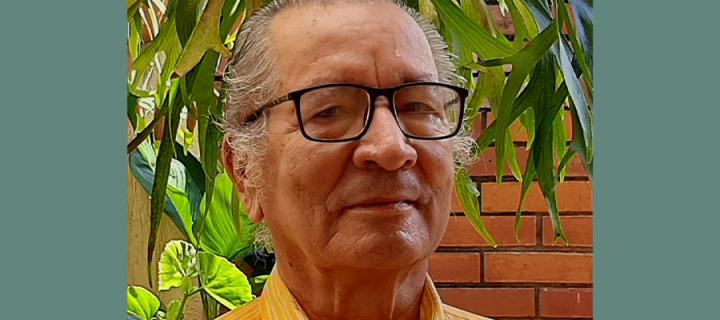Rodrigo Escobar Holguín
After a long career in Columbian urban planning that saw him dealing with decision-makers at the highest national level, Rodrigo Escobar Holguín retired and returned to education, recently completing a philosophy PhD.
| Name |
Rodrigo Escobar Holguín |
| Degree Course |
MPhil Urban Design and Regional Planning |
| Year of Graduation |
1973 |

At the moment
Right now, I am an informal, happy student of phenomenological philosophy. I am a retired person who worked for the Colombian government at the Cauca Valley Regional Corporation (CVC) in Cali from 1977 to 2000. In 2019 I became a Doctor of Philosophy at the Universidad del Valle.
Your time at the University
I arrived in Edinburgh in 1971 as an architect experienced in school design, wanting to broaden my field of work and expecting to become an urban designer, but the strengths of the programme were in urban and regional planning, a still wider matter. At that time only Liverpool and Edinburgh offered a master’s degree in town planning and design. I did some research on the urban environment of these cities and chose Edinburgh. I had to adapt quickly to a different academic, linguistic and cultural environment.
I lived with my wife with a scholarship from the Overseas Development Department in a room at Drummond Place, at the home of the late Frank Clark, landscape architect, and I crossed almost daily what is today the World Heritage Site from north to south and back, since the department where I studied was at 59-60 George Square. I remember with warmth the teachings of Professors Percy Johnson-Marshall, Erik Anthony Rowse, Richard Bigwood and others. They introduced me, among other things, to the work of Patrick Geddes, the Scottish founder of regional planning, whose approach of experiencing, understanding, willing (projecting) and acting was the subject to which I tried to provide a philosophical foundation in my recent PhD thesis.
I also have an enduring memory of the Royal Botanic Garden and the Water of Leith, my favourite recreational spaces, though I also had opportunities like going on a sleigh at the Pentland Hills in winter. I love Calton Hill, too and I continue 'visit' Edinburgh via the internet.
I recently found out that Francisco de Paula Santander, our national hero, visited Edinburgh while in exile inJuly 1831. According to his diary he stayed at the Hotel Falconer. I found that it was at 20 Moray Place.
I left the UK on the 1 November 1973.
Your experiences since leaving the University
My studies in Edinburgh marked my life's work from then on. First, I worked as a town planner in the national capital. Then I returned to Cali, where I had graduated as an architect, and worked for over two decades with the regional government. The Cauca Valley is a valuable agricultural plain, with a complex urban system, and I helped to orientate urbanisation so to save agricultural land and avoid inconvenient locations. Industrial location was also a concern, and I searched and proposed criteria for it. Recreational resources were identified in the region and advice was provided on their care and use.
Usually there was no administrative conflict on my recommendations. Once our internal legal dependency did not support my claim that certain crops should not be grown on steep slopes because of soil loss risk. Our lawyers said cultivators were free to grow what they wanted; the disagreement went up to the highest possible national level. There, I was right.
Years after, when the country adopted a law for municipal town and country planning, the Valley was in an advanced position to implement the law. First we were given the task of advising the municipalities in the formulation of their plans, then we negotiated approval. I was in charge of organising the interdisciplinary team and specifying the procedures for the task, and afterwards of leading the negotiations. When the turn was for Cali, the regional capital, the municipal team did not agree with our recommendations, and the whole thing had to go to ministerial level, where our proposals were backed up.
After retirement I studied philosophy in order to find foundations for our planning efforts. My PhD thesis on “territory and communitarian will” obtained the highest honours. It will soon be published. I keep on studying.
Life during Covid-19
Besides some painful personal losses, I feel my life and goals have not been seriously affected. My children have grown up, but I miss seeing my grandson more frequently. Apart from that, as my habits are rather austere and monastic, I have felt almost no change in my daily life. A few extra cares, no more. I have been able to read, search, write, communicate. Thanks, God, for internet.
Alumni wisdom
Be courageous and keep alert and creative for the opportunities of betterment that may appear in and around you, your place, your people, your work - your institutions. Spell them out and help people to realise them.

